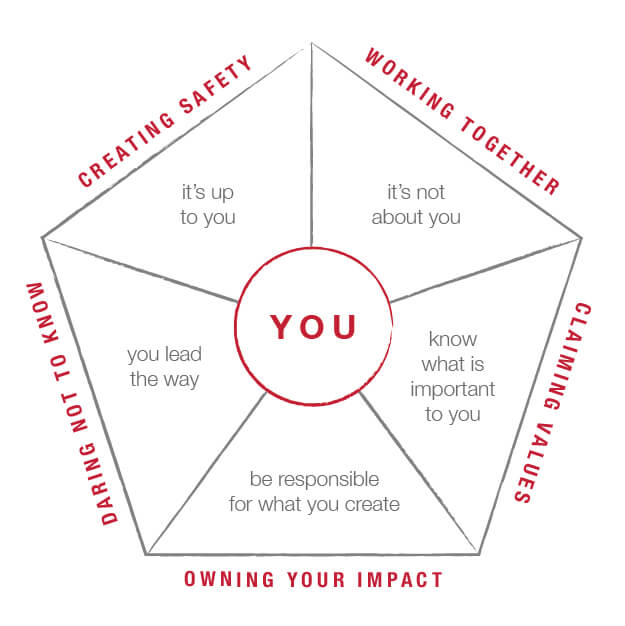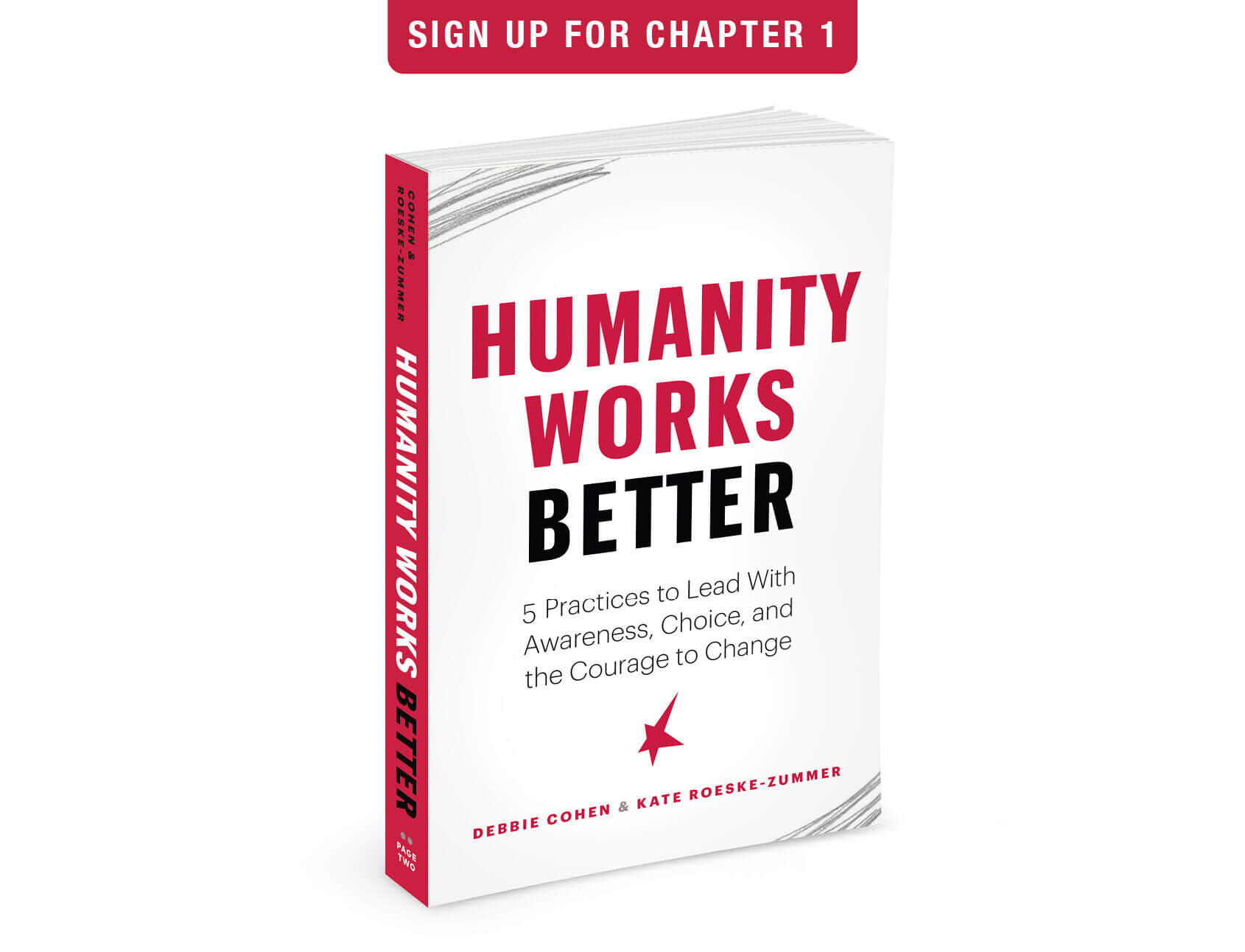Outside of our programs, this was the first time a group of people fired off specific questions about our model and how it can help them navigate with greater impact and humanity.
For the past 10 years Debbie has participated each quarter as a panelist at the New Manager Bootcamp, a leadership training program at UC Berkeley Haas School of Business. This program is run under the direction of management expert, Dr. Homa Bahrami. It is designed to increase the self-awareness of new managers and ignite their capabilities to inspire and motivate others to thrive. At the end of the week-long program, a panel of senior executives come to chat openly with the participants and field questions, all intended to help encourage them on their leadership journey.
This time the format was a little bit different. Rather than staying in a large group for Q&A, participants were placed in a breakout room with a panelist. The group had 30 minutes for Q&A. Deb was placed in a room with about 15 managers. To get the group started, Deb asked “What will serve you all best in the next 30 minutes? What would you like to walk away with?” Their request was for her to share the HumanityWorks Model and then field their questions.
Surprised, but delighted with the opportunity to share our work, Deb gave a quick orientation to the model, which, as a refresher, is centered on YOU. She explained our rationale that if things are not right in your work or personal life, change starts with you because it’s the only thing you can actually control.
Each practice was briefly explained:
- Creating Safety builds trust, and It’s up to you.
- Working Together manifests resilience, and it’s not about you.
- Claiming Value produces alignment, so you need to know what is important to you.
- Owning Your Impact drives accountability, so you need to be responsible for what you create.
- Daring Not to Know creates engagement, you lead the way.
Outside of our programs, this was the first time a group of people fired off specific questions about the model and how it can help them navigate with greater impact and humanity. In a fun and applicable way, their questions brought the practices and our superpack of skills to life.

Here are a few examples:
Q. I’m still stunned by your explanation of Daring Not to Know and the idea that leaders don’t have all the answers. Realizing this, how can we help? What do we say to a boss knowing they are trying to figure things out? How do you ask questions of them or offer suggestions without embarrassing them or coming across as arrogant?
A. Great questions! Two powerful skills can be used in the practice of Daring Not to Know. One is acknowledgement. Start by letting the leader know you appreciate their efforts to sort the issue out and get clarity around the issue and the impact that has on you (greater confidence, patience, focus, etc). The second skill to put into practice is curiosity and powerful questions. This superpack skill is the antidote to judgment.
The group brainstormed some helpful questions to ask, depending on the context:
- “What are you learning?”
- “What are you noticing?”
- “What are you grappling with?”
- “What feels challenging?”
- “How can we best support what you are trying to do?”
- “How can we best share our insights?”
Acknowledgment helps a person feel seen for what they are doing and how they are being. It creates a mutual connection. Approaching leaders or your boss with powerful questions allows for expansive thinking and the opportunity to explore ideas without demanding specific answers. Daring Not to Know is a practice for everyone, it is not reserved for those in positional power; it fosters deeper participation and engagement.
Q. I have raised an issue repeatedly with my manager and they are doing nothing with it. Nothing is happening. Is it ever okay to jump over your boss and take an issue directly to their manager? (Side note…a version of this has been asked in every boot camp for the past 10 years!)
A. Clearly, this situation is impacting you and it’s always a good idea to pause and ask the question as there are implications for going over your immediate supervisor’s head. This situation sits in the practice of Working Together, where the focus is not on you, but on them, in this case, your immediate boss. The practice requires stepping toward the person of your concern to learn what is actually going on for them. So how do you do that?
There are three powerful skills that will immediately help you: perspective, listening and curiosity/powerful questions. The first is perspective. Your perspective is that nothing is happening, which may or may not be true. From your field of vision there is no action so your assumption is nothing is taking place. The only way to quiet your assumption making machine and know what is happening for certain is to ask them. Most folks get stuck with what to say, so here again the skill of curiosity and powerful questions are once again your friend! And once you ask great questions, that’s where listening comes in. Stay focused on them, listen for what they are saying…and maybe for what they are not through pauses and body language. Ask follow-up questions to garner a deeper understanding of how they are thinking about the issue and what they need in order to help you.
The group generated these questions:
- “I’ve raised [the topic] in our last two one-on-ones and can use your help moving the issue forward. I’m curious how you are thinking about [the topic]? What questions do you have? What do I need to know?”
- “I am still at a roadblock with [topic]. My concern is further delay will impact our ability to deliver XYZ. I could use your help [make a specific request]. What questions do you have? What else do I need to understand about this issue? What is your recommended next step for me?”
- “I could use your help with [topic]. Is there any more information you need from me? What do next steps look like? When will I know? How can I support you?”
Until you step toward them, you actually don’t know what’s going on with another person. The only way to know is to ask: with curiosity, in an open posture and without judgment. And then truly listen. Good questions unlock our assumptions and become the lubricant for deeper understanding and collaboration.
Q. I have someone on my team who is doing the work – they are actually a high performer – but I can tell they just aren’t really there. They are going through the motions and getting work done, but their eyes tell another story. They are disengaged. How do I address this when it’s not about performance?
A. I love this question and I think it is timely for a lot of managers right now. Here we step into the practice of Owning Your Impact. The thing about impact is people are having them all the time; some are intended, some are not. You only know about the impact you are creating when someone tells you. This person is creating an impact on you, one that they may, or may not be aware of. So your role is to make them aware of the impact they are creating without casting blame, and get curious about what’s going on. The superpack skills of acknowledgement, listening and curiosity/powerful questions come back into play here.
Ideas generated to start the conversation included:
- “I really appreciated [insert acknowledgment]. Despite all that, I am noticing a distance in you that is different. What’s going on?”
- “We have been so preoccupied with work lately and haven’t paused to catch up. While you are [insert acknowledgement], I’m concerned about you. You seem detached. How can I support you best right now?”
- “I am thrilled with your work [insert acknowledgement] but it feels like you are going through the motions, like your heart isn’t in it. What should we be talking about?”
Helping people understand the impact they are creating is a form of feedback. Quieting your internal assumption machine, stepping towards another human being and getting truly curious about what is happening for them is a gift of humanity and a sign of a great manager.
It was fun to field these questions through the lens of our model and superpack of skills and see how they resonated with the group. Being a great leader, a great manager, a great human requires no special equipment. It only takes awareness, choice and the courage to change. Humanity is a powerful component to helping business and people thrive.
Humanity works because of you!
Kate and Debbie

